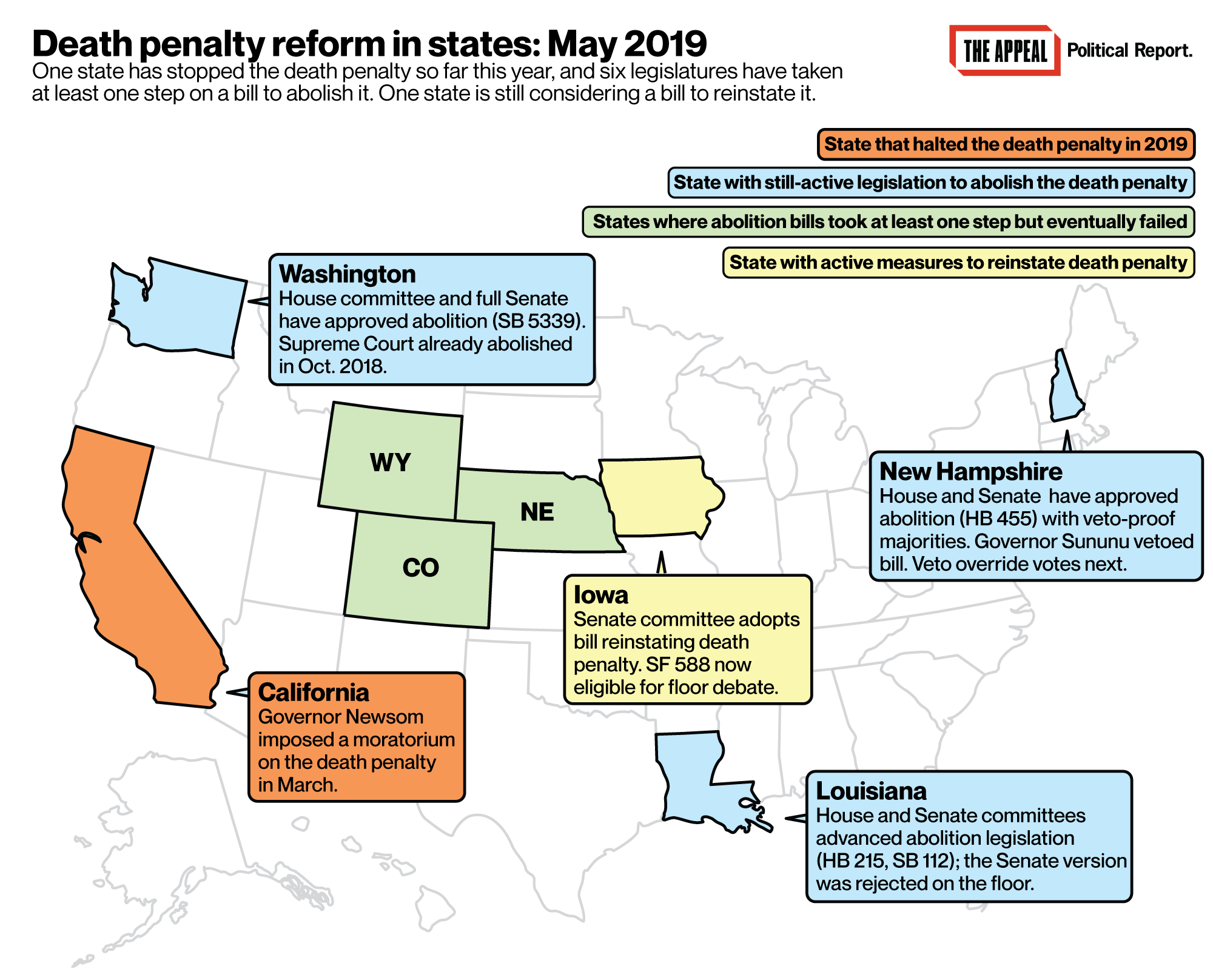Political Report
Legislative Roundup: May 16, 2019 Edition
Colorado requires free menstrual hygiene products in jails and restricts pretrial detention, Louisiana takes a step against incarcerating witness, and more
Criminal justice reform in the states: Colorado requires free menstrual hygiene products in jails and restricts pretrial detention, Louisiana takes a step against incarcerating witness, and more
This update is drawn from the Daily Appeal and Political Report newsletters.
Find more on our interactive map of legislative action.
Colorado
Local jails will now need to provide free menstrual hygiene products to people in custody. A new law, sponsored by lawmakers Leslie Herod and Faith Winter, extends a mandate that already existed in state prisons. According to 9News, the catalyst for this reform was Elisabeth Epps, an activist with the Denver Justice Project, who has talked about the difficulties she had experienced getting such products while she was detained in jail for interfering with police.
Epps also plays a central role in state organizing against cash bail—and the state just moved on this issue too: A new law will prohibit the use of money bail in petty offense cases and most traffic offense cases. That is a modest reform compared to changes adopted elsewhere, though the legislature also passed a separate bill (the governor has yet to sign it) that requires bond hearings within 48 hours of arrests, rather than letting people languish in jail for longer.
Indiana
A new law will expand reentry services available to people who are exonerated. It also provides exonerated individuals $50,000 of restitution for each year they were incarcerated. However, exonerated people will only qualify if they forego all litigation against the state. Kristine Bunch, who was exonerated in 2012 after being incarcerated for 17 years and who has founded the nonprofit Justis 4 Justus to assist exonerated people, criticized the reform for asking people to make this choice. “Saying you can’t have a civil suit in addition to receiving help … it’s like they’ve gotten away with it,” she told the Hendricks County Flyer. “Go in and spend 60 days in prison, then you will realize how shamed I was, how mentally and physically tore down I was,” she said in another interview. The bill was sponsored by Republican Representative Greg Steuerwald.
Louisiana
Louisiana DAs put victims in jail to compel them to testify in criminal proceedings. The Senate adopted legislation in May to restrict the use of such “material witness warrants” against victims of sexual offenses and domestic violence. The reform was narrowed along the way. The original bill (introduced by Democratic Senator Jean-Paul Morrell) barred jailing such people entirely; but the bill that passed was amended on the Senate floor and only prohibits it in misdemeanor cases. In felony cases, jailing victims is restricted, but not barred. The head of the Louisiana District Attorneys Association testified against the original version in committee.
Louisiana and New Hampshire
New Hampshire Governor John Sununu vetoed legislation abolishing the death penalty, as he had already done in 2018. But this year the bill passed both chambers with veto-proof majorities, so its proponents should be able to override Sununu’s veto unless lawmakers change their votes.
On Tuesday, a House committee advanced to the floor a bill abolishing the death penalty. Republicans outnumber Democrats on the committee, but two of them did not vote; no Republican who did vote supported abolition. A Senate committee advanced another abolition bill in April, but it was rejected on the Senate floor last week. Louisiana is one of six states where abolition has taken at least one legislative step this year.
Massachusetts
A bill that would ban cell phones while driving but also monitor for racial profiling in its enforcement passed the Massachusetts House of Representatives this week. The bill calls for the state to study the feasibility of expanding data collection to include “the race and gender of each individual subject to traffic stops,” whether or not a citation is issued. This came in response to concern that enforcing a ban on cell phone use while driving would lead to racial profiling by police officers. The bill would require the Registry of Motor Vehicles to collect the data from police departments, submit it to state officials, and have it studied and made public. Advocates for racial equality routinely warn that new laws will result in disparate enforcement.
